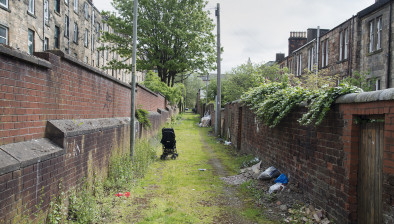England: Labour sets out vision for ‘council housing revolution’

Deputy prime minister Angela Rayner
Deputy prime minister and secretary of state for housing Angela Rayner has announced the UK Government’s first steps to reform planning in England.
The ambitions include building 370,000 new homes each year, reforming council housing targets, and enforcing new provisions to open up the metropolitan green belt.
In order to ‘get Britain building’ there will also be a new methodology to calculate housing need, a grey belt definition, and a set of “golden rules” that stipulate 50% of affordable housing with a focus on social rent on that land.
A consultation which closes on 24 September 2024 will set out their proposals.
Homelessness charity Crisis said it was pleased to see measures tackle the chronic shortage of social and affordable housing.
Among the proposals outlined by the deputy prime minister include an immediate flow of the Local Authority Housing Fund to local authorities of £450 million to provide 2,000 homes for the ‘most vulnerable’, more flexibility to be introduced to the current Affordable Homes Programme with details about future investment plans to follow, immediate flexibilities for local authorities on use of Right to Buy receipts as well as a longer-term review and the publication of a long-term housing strategy.
Crisis chief executive, Matt Downie, said: “After a huge net loss of social homes over the past decade, today’s emphasis on social and affordable housing is extremely welcome and suggests that the new Westminster government recognises this national scandal must urgently be brought to an end. Right now, hundreds of thousands of households are facing the worst forms of homelessness across England, stuck in cramped temporary accommodation or forced to sleep on the streets.
“We look forward to seeing how the government plans to deliver 50% affordable housing on Green Belt land with a focus on social rent, and to make sure councils and developers work together to build the 90,000 social homes we need to end homelessness for good.”
The Federation of Master Builders (FMB) said the return of national housing targets is welcome and very much needed if the government is to deliver the 1.5 million new homes that it wants to build over the next five years.
Brian Berry, chief executive of the FMB, said: “The UK’s planning system has long been in desperate need of reform. Today’s announcement is a statement of intent which will be welcomed by small house builders. The return of national housing targets is good news as is the requirement for councils to demonstrate a five-year land supply for new housing.
“There are fundamental issues with the UK housing system that need tackling to hit the Government’s ambitious targets. We are far too reliant on too few developers to build homes, with smaller developers pushed to one side, damaging competition, and consumer choice.
“The 50% affordable target on brownfield sites is a concern as many small developers can’t get housing associations to buy their section 106 social homes, meaning homes are going unbuilt. Without reform of the social housing system, this will hold back delivery. But behind all of this is a lack of builders to deliver these homes, without a serious plan to boost the vocational skills system in this country, we’ll be unable to deliver 1.5 million homes.”
Richard Beresford, chief executive of the National Federation of Builders (NFB), said: “The government is reintroducing the policies which ensured the Conservatives broke the 200,000 new homes a year mark, plus adding some extra dimensions, such as the grey belt, strategic planning, and redefining how some of the grey belt is used.
“It’s certainly a positive start but if the government is serious about building 300,000 homes a year, or 370,000 as we heard today, these tweaks will not cut it and we need major reform which explores what the barriers are, not just to local plans and permissions, but the rules stopping spades going in the ground.”
Rico Wojtulewicz, head of policy and market insight at the NFB, added: “We need to study the full consultation but so far so good. Particularly the mention of strategic planning, bringing back targets and upping the targets. It was also interesting to see the supply target for London reduce by 20,000 to 80,000. This shouldn’t really worry anybody because the capital would still need to double output to reach that figure.
“I would however urge the government to focus on commercial impacts of the planning process and why diversification is so important to growth.
“SMEs, who typically deliver up to 250 homes a year, weren’t mentioned, despite them training 8 in 10 construction apprentices and being the ones who build the social housing for councils and housing associations. Biodiversity Net Gain also didn’t feature, even though it is likely to scupper affordable housing ambitions and new towns, just like it is scuppering the business models of SMEs. These two examples need to be top of any government’s agenda and we will be working day and night to remind them of that.”
Nathan Emerson, CEO of Propertymark, said. “Propertymark is keen to work closely with the new UK Government to help ensure a balanced mix of housing is delivered across the next parliamentary term and beyond. Ensuring sustainable homes are delivered in key areas is paramount for the economy and it’s encouraging to hear Angela Rayners commit to an in ‘infrastructure first’ approach, and one that focuses on making full use of available brownfield and grey belt land where possible first.
“Propertymark has long called for an enhanced housing strategy to be developed and one that can deliver for generations to come, so it’s positive to hear this will become an integrated ambition moving forwards. It is essential housing supply has seamless continuity and keeps pace with demand, so the return of mandatory housing targets and a commitment to building a mixture of housing becomes a reality.
“Ultimately, future direction to deliver the 1.5m new homes promised must be driven by robust insight and delivered with precision with via close stakeholder engagement.”
The UK Green Building Council said turning thousands of empty buildings into affordable homes would be a clear win.
Simon McWhirter, deputy chief executive officer at the UK Green Building Council, said: “Planning reform is a tightrope and Angela Rayner clearly appreciates that. A clear win would be to turn the tens of thousands of empty houses and buildings that blight high streets and neighbourhoods into affordable homes.
“No-one wants to see unchecked urban sprawl, so the new ‘grey-belt’ designation must be properly defined and should be primarily limited to nationally strategic sites. Exceptions for small scale affordable housing already exist for communities in green belt areas.
“To avoid a nationwide backlash, people will need to feel the benefit from new homes and clean energy infrastructure. The Government understands this means a much higher proportion of genuinely affordable, high-quality housing with excellent access to public services, public transport and green spaces. A neat solution already has momentum and was backed by Labour in Opposition – legally wedding the planning system to the Climate Change Act so every planning decision helps meet, not scupper, the UK’s climate and nature restoration goals.
“A revitalised National Policy Planning Framework is a chance to quickly pivot planning policy towards the well-considered, coordinated and holistic system we need to bring climate emissions under control and halt the collapse of nature. We’ll be convening experts from across the built environment sector to help the Government get this right.”
RSM UK warned that Labour’s commitment to social housing fails to address the availability of finance.
John Guest, national head of social housing at RSM UK, said: “The government’s announcement today signals a positive change in momentum for social housing to increase the supply of affordable and social housing. This commitment suggests government is listening to the sector, having previously raised concerns about the level of affordable housing development.
“More encouragingly, the deputy prime minister acknowledged the importance of collaborating with housing associations, local authorities and other industries bodies to deliver housing targets and long-term economic growth. This offers further opportunity for housing associations to influence decision making for the communities they support with job creation and providing high-quality housing. Government’s focus on building more homes on green belt and grey field land in areas with access to education, healthcare and transport services brings further welcome news, providing tenants with a stable environment.”
He added: “But, the government needs to address the availability of finance to support its ambitions, especially if housebuilding is accelerated. Social housing continues to face financial challenges relating to investment in existing stock, meeting sustainability targets, and developing new homes. Registered Providers of Social Housing are also under pressure to improve the quality of housing while keeping rents affordable and placing the tenant at the heart of the organisation. The government’s incoming housing strategy therefore needs to outline how funding will be allocated to ensure safe, high-quality social housing while keeping rental costs as low as possible.”







